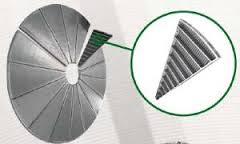
Sintered mesh screens for Petroleum refinery processes
Petroleum refineries use a process based Fluid catalytic cracking to transform heavy petroleum materials in gasoline, kerosene and feedstock for further processes. The transformation of crude oil materials in precious products involves the use of catalysts.
Filtration equipments are used to separate catalyst fines from slurry oil by using sintered mesh porous metal screens to achieve the long term service of FCC catalyst. Slurry oil filtration is performed by using durable filter screens. The filtration media inhibits the removal of downstream catalyst contamination. Use of sintered mesh is a reliable way to achieve good quality slurry oil by decreasing catalyst concentration. The mesh can be backwash cleaned. Elimination of fines enhances the product yield, increasing the price value of filtered product and also limits the wear and tear of downstream equipments besides to enhancing the catalyst recover and handling process.
Features of Sintered metal mesh
Sintered metal mesh is suitable for use in refinery applications for its high strength, durability and pressure tolerance. The durability of mesh screens permits regular backwash for longer periods. Sintered mesh are made by pressing alloy screens during high temperature sintering. This process features high strength and good permeability of the porous element. The filter screen is designed using a stable matrix, precise bubble point specification, close thickness tolerance and eveness of permeability that ensure consistent filtration performance, suitable backwash cleaning and long term service life.
Use of stainless steel 316L is suitable in refinery operations.
Removal of Catalyst Fines
Considering the variations in slurry oil viscosity, catalyst particle size and slurry concentration of every refinery process the recommended method of choosing filter media is through lab or pilot trails. The particle size of catalyst material depends on the process performance of the device. FCC catalyst are widely used depending on the method of production of silica or clay containing alumina. Suitable filtration outcomes are received through wide particle size distribution.
Further fine metal mesh screens are required for small mean particle size catalyst. In contrast, a larger particle size and broad distribution requires coarser media. Sintered metal mesh screens used for refinery process applications ensure high particle removal efficiency and prevent media plugging.
Refineries demand advanced filtration technology that has become possible by using sintered mesh cartridge filters to remove catalysts. Filtration analysis of slurry oil streams from different refineries show considerable variation in catalyst particle and distribution range.
Sintered mesh screens with high efficiency strain the particulate collected on the surface. The suitable selection of mesh screen balance the requirement of a filtration application considering particle retention, pressure drop and backwash capacity. The basic process factors considered while choosing a sintered screen are: fluid velocity through the screen, fluid viscosity and particle features.
The essential particle properties are particle specifications and density. Hard particles in regular shapes that develop incompressible cakes like FCC catalyst can be easily filtered through sintered mesh. Sintered mesh screens feature uniform pressure drop over time of repeated cycles in the filtration operations ensuring improved particulate removal and good backwash efficiency.
 +1 206 890 7337
+1 206 890 7337 sales1@nickel-wiremesh.com
sales1@nickel-wiremesh.com